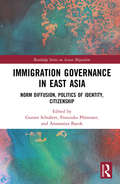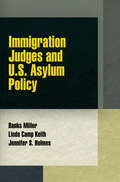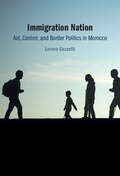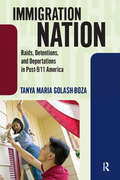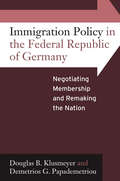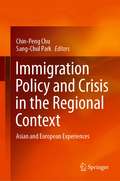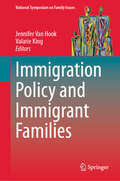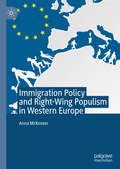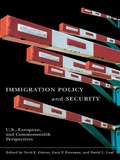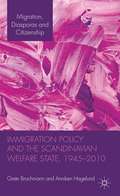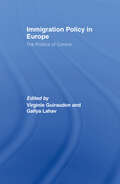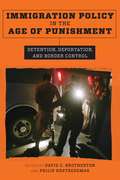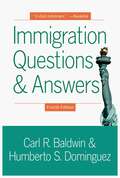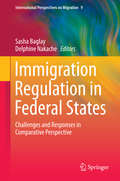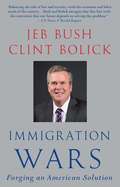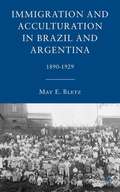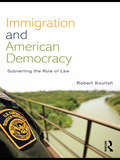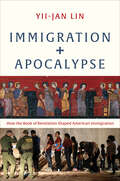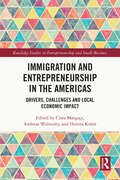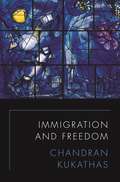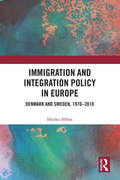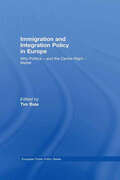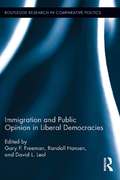- Table View
- List View
Immigration Governance in East Asia: Norm Diffusion, Politics of Identity, Citizenship (Routledge Series on Asian Migration)
by Gunter Schubert, Franziska Plümmer, and Anastasiya BayokThis book analyzes immigration policies in East Asia in the context of contemporary global migration flows and mobility. To assess how global norms of migration have impacted the East Asian migration region and explore regional migration trends, the book contains 13 case studies which investigate the regulation of immigration in China, Hong Kong, Japan, South Korea, and Taiwan. Three analytical strands, namely, norm diffusion, identity politics, and citizenship, build the theoretical framework for the case studies which investigate how regional and national norms, discourses, and institutions affect local communities and migration patterns. In particular, the book analyzes contemporary issues such as immigration policy reforms, practices of inclusion and exclusion in local communities, and discourses on multiculturalism and risk. The book utilizes a comparative perspective which enables readers to reflect on the role of national identity, international organizations and law, public security concerns, and labour market demands in the articulation and implementation of contemporary immigration policy in East Asia. This book substantially complements the existing literature on immigration governance and interregional migration mobility in East Asia and will be of interest to academics in the fields of East Asian studies, public policy, immigration and migration studies, and comparative politics.
Immigration Judges and U.S. Asylum Policy (Pennsylvania Studies in Human Rights)
by Jennifer S. Holmes Linda Camp Keith Banks MillerAlthough there are legal norms to secure the uniform treatment of asylum claims in the United States, anecdotal and empirical evidence suggest that strategic and economic interests also influence asylum outcomes. Previous research has demonstrated considerable variation in how immigration judges decide seemingly similar cases, which implies a host of legal concerns—not the least of which is whether judicial bias is more determinative of the decision to admit those fleeing persecution to the United States than is the merit of the claim. These disparities also raise important policy considerations about how to fix what many perceive to be a broken adjudication system.With theoretical sophistication and empirical rigor, Immigration Judges and U.S. Asylum Policy investigates more than 500,000 asylum cases that were decided by U.S. immigration judges between 1990 and 2010. The authors find that judges treat certain facts about an asylum applicant more objectively than others: facts determined to be legally relevant tend to be treated similarly by judges of different political ideologies, while facts considered extralegal are treated subjectively. Furthermore, the authors examine how local economic and political conditions as well as congressional reforms have affected outcomes in asylum cases, concluding with a series of policy recommendations aimed at improving the quality of immigration law decision making rather than trying to reduce disparities between decision makers.
Immigration Nation: Aid, Control, and Border Politics in Morocco
by Lorena GazzottiOver the past forty years, countries in the Global North have increasingly restricted their migration policies to reduce the arrival of migrants. As part of this, development aid has become a central tool in the migration control strategy pursued by European countries and the US, with donors, International Organisations and NGOs becoming prominent actors. In this book, Lorena Gazzotti shows that migration control is not only exercised through fences and deportation. Building on extensive research in Morocco, Gazzotti shows that aid marks the rise of a substantially different mode of migration containment, one where power works beyond fast violence, and its disciplinary potential is augmented precisely by its elusiveness. Where existing studies on border externalisation have essentialised donors, International Organisations and NGOs, with countries of 'origin' and 'transit' as compliant subcontractors, and border control as a neat form of intervention, this nuanced study unsettles such assumptions, to show that bordering happens in everyday, mundane fashions, far away from the spectacle of border violence.
Immigration Nation: Raids, Detentions, and Deportations in Post-9/11 America
by Tanya Maria Golash-BozaIn the wake of September 11, 2001, the Department of Homeland Security (DHS) was created to prevent terrorist attacks in the US.This led to dramatic increases in immigration law enforcement - raids, detentions and deportations have increased six-fold. Immigration Nation critically analyses the human rights impact of this tightening of US immigration policy. Golash-Boza reveals that it has had consequences not just for immigrants, but for citizens, families and communities. She shows that even though family reunification is officially a core component of US immigration policy, it has often torn families apart. This is a critical and revealing look at the real life - frequently devastating - impact of immigration policy in a security conscious world.
Immigration Policy In The Federal Republic Of Germany
by Demetrios G. Papademetriou Douglas B. KlusmeyerGerman migration policy now stands at a major crossroad, caught between a fifty-year history of missed opportunities and serious new challenges. Focusing on these new challenges that German policy makers face, the authors, both internationally recognized in this field, use historical argument, theoretical analysis, and empirical evaluation to advance a more nuanced understanding of recent initiatives and the implications of these initiatives. Their approach combines both synthesis and original research in a presentation that is not only accessible to the general educated reader but also addresses the concerns of academic scholars and policy analysts. This important volume offers a comprehensive and critical examination of the history of German migration law and policy from the Federal Republic's inception in 1949 to the present.
Immigration Policy and Crisis in the Regional Context: Asian and European Experiences
by Chin-Peng Chu Sang-Chul ParkThis book compares the immigration policies of EU states and Asian countries—Germany, Poland, Estonia, Taiwan, China, South Korea, Japan, Vietnam,- and Thailand—analyses the policy strengths and weaknesses of various political actors in the regions and explores what can be learned from the experiences of different states. In the recent decades, immigration policy has become a hot topic due to globalization. EU has faced challenges in immigration since the refugee crisis in 2015 when over a million migrants and refugees crossed into Europe. In Asia, immigration issue has become more complicated as the economic ties among Asian countries have grown significantly in recent years. With contributions by professors, experts and scholars from various countries across Europe and Asia, the book provides both in-depth analyses and broad perspectives on the topic, making it a valuable read for academics and policymakers alike.
Immigration Policy and Immigrant Families (National Symposium on Family Issues #NA)
by Jennifer Van Hook Valarie KingThis book examines how immigration law impacts U.S. immigrant families. It addresses how admission and border policies shape family formation and contribute to prolonged family separation; how immigration enforcement affects parenting practices; and how immigrants’ unique challenges spill over to influence broader kinship support networks. Chapters describe family reunification and separation policies; return migration and binational family life; how young immigrants reconnect with family abroad and navigate romantic relationships in the United States; parents’ engagement with surveilling actors and institutions; the impact of immigration policy on parenting, including during the pandemic; the health and well-being of DACA (Deferred Action for Childhood Arrivals)-eligible adults and their children; aging and family dynamics among Asian immigrant families; and the impact of immigrant legal status across generations. Finally, the volume offers recommendations for family researchers on ways to advance our understanding of the short and longer-term effects of immigration law and policies on the formation, structure, and functioning of immigrant families. Key areas of coverage include: Immigrant laws and policies that shape the formation and separation of immigrant families. Immigrant parenting in the context of immigration enforcement. Effects of DACA and other immigrant policies on child and adult health and well-being. Long-term impacts of immigration policy over time and across generations. Opportunities for family research to better understand how immigration policies and practices shape families, parenting, and child health and well-being. Immigration Policy and Immigrant Families is a must-have resource for researchers, professors, and graduate students as well as clinicians, therapists, and other professionals in developmental psychology, family studies, sociology, and such interrelated disciplines as demography, social work, prevention science, public health, educational policy, political science, and economics.
Immigration Policy and Right-Wing Populism in Western Europe
by Anna McKeeverImmigration has become one of the central issues dominating the agenda of political parties, and has also played a crucial role in the rise of right-wing populism in Western Europe. This book explores the role of conservative parties in immigration policy change. The following questions are addressed: What explains the introduction of restrictive immigration policies across a number of European states? Why do conservative parties choose to toughen their immigration policy stances? How can we explain the variation in the factors that affect conservative parties’ immigration policy-making logics? What mechanisms account for the dynamics of immigration policy change or policy deadlock? Based on interviews with political elites and policy makers in the UK, Switzerland and France, the book explains why governmental conservative parties in these countries revised their immigration policy stances and steered immigration policy in a more restrictive direction between 2002 and 2015.
Immigration Policy and Security: U.S., European, and Commonwealth Perspectives
by David L. Leal Gary P. Freeman Terri GivensImmigration policy in the United States, Europe, and the Commonwealth went under the microscope after the terror attacks of 9/11 and the subsequent events in London, Madrid, and elsewhere. We have since seen major changes in the bureaucracies that regulate immigration—but have those institutional dynamics led to significant changes in the way borders are controlled, the numbers of immigrants allowed to enter, or national asylum policies? This book examines a broad range of issues and cases in order to better understand if, how, and why immigration policies and practices have changed in these countries in response to the threat of terrorism. In a thorough analysis of border policies, the authors also address how an intensification of immigration politics can have severe consequences for the social and economic circumstances of national minorities of immigrant origin.
Immigration Policy and the Scandinavian Welfare State 1945–2010
by Grete Brochmann Anniken Hagelund Karin Borevi Heidi Vad Jønsson Klaus PetersenThis book explores the historical development of post-war immigration politics in Norway, Sweden and Denmark from the perspective of the welfare state, examining how welfare states with high ambitions, generous and inclusive welfare schemes and a strong sense of egalitarianism cope with the pressures of immigration and growing diversities.
Immigration Policy in Europe: The Politics of Control (ISSN)
by Virginie Guiraudon and Gallya LahavPreviously published as a special issue of West European Politics, this edited volume evaluates the extent to which a policy gap between inputs and outcomes exists with regard to immigration control. In exploring an expanded migration policy-field which includes the extreme right, the media and actors, this book goes beyond traditional analyses tha
Immigration Policy in the Age of Punishment: Detention, Deportation, and Border Control (Studies In Transgression Ser.)
by Philip Kretsedemas Edited by David C. BrothertonThe events of 2016 catapulted immigration policy to the forefront of public debate, and Donald Trump’s administration has signaled a harsh turn in enforcement. Yet the deportation, detention, and border-control policies that North American and European countries have embraced are by no means new. In this book, sociologists David C. Brotherton and Philip Kretsedemas bring together an interdisciplinary group of contributors to reconsider the immigration policies of the Obama era and beyond in terms of a decades-long “age of punishment.”Immigration Policy in the Age of Punishmenttakes a critical, interdisciplinary, and transnational look at current issues surrounding immigration in the U.S. and abroad. It examines key features of this age of punishment, connecting neoliberal governance, global labor markets, and the national obsession with securing borders to explain critical research and theory on immigration enforcement. Contributors document the continuities between presidential administrations and across countries from many perspectives, with chapters discussing Canada, Australia, France, the UK, the Dominican Republic, and Mexico in addition to the U.S. They offer macro-level analyses of deportations and border enforcement, analyses of national policy and jurisprudence, and ethnographic accounts of the daily life experience of the prison-to-deportation pipeline, the making of deportability, and post-deportation transitions for noncitizens. This book highlights new directions in critical immigration policy and enforcement and deportation studies with the aim of problematizing the age of punishment that currently reigns over borders and those who seek to cross them.
Immigration Questions & Answers
by Carl R. Baldwin Humberto S. DominguezA Comprehensive, User-Friendly Guide for Anyone Planning to Live Temporarily or Permanently in the United States The process of acquiring and retaining the right to visit or live in the United States is an interesting and complex subject. US immigration laws have not changed very much during the Trump administration, and yet the experience of immigrating to the United States has definitely been affected by it. In this concise primer, first conceived and designed as a how-to resource for would-be &“green card&” holders in the 1990s, the process of getting and keeping a visa is explained and updated in this new edition. In simple terms, the authors provide a breakdown of the most important topics in this area with useful examples. With over thirty years of experience practicing law, co-author Humberto S. Dominguez adds valuable insights and observations to this increasingly important topic. The road to legal residence in the United States can be a tricky and elusive endeavor. Immigration Questions & Answers, Fourth Edition, will guide you every step of the way, with a down-to-earth approach and invaluable advice. Chapters cover topics such as:Obtaining a short-term visaPolitical asylumTemporary Protected StatusDACA for DreamersThe visa lotteryHelping your spouse get a green cardRemoving conditions on residenceVisa processingWays to become a US citizen Persons who hope to visit or live in the United States and even lawyers unfamiliar with immigration law and practice will benefit from this basic guide. People facing particular difficulties in this area, who may ultimately need the assistance of an immigration lawyer, will also benefit from learning the bare essentials.
Immigration Regulation in Federal States
by Sasha Baglay Delphine NakacheThe book examines the phenomenon of immigration federalism: its main characteristics, why and how it has developed, its implications for immigration systems (in general) and non-citizens' rights (in particular). The book introduces the reader to theoretical perspectives on immigration federalism through three sets of literature - federalism, governance and non-citizens' rights - that provide a necessary framework for understanding immigration federalism's multiple facets and impacts. It also offers an analysis of immigration federalism through case studies of six jurisdictions: Australia, Canada, Germany, Switzerland, the EU and the US. Despite increased sub-national activity in immigration regulation in several federal states, very little research has been dedicated so far to comparing how federal states deal with immigration federalism. Comparative studies on the human rights implications of immigration federalism have received even less attention. This book seeks to fill the gap in this area and is an important contribution to the field, providing the reader with a better understanding of the complex issues surrounding immigration federalism and its impact on non-citizens.
Immigration Wars: Forging an American Solution
by Clint Bolick Jeb BushThe immigration debate has challenged our nation since its founding. But today, it divides Americans more stridently than ever, due to a chronic failure of national leadership by both parties. Here at last is an attainable resolution guided by two core principles: first, immigration is vital to America's future; second, any enduring resolution must adhere to the rule of law. Unfortunately, current laws are so cumbersome and irrational that millions have circumvented them and entered the United States illegally, taxing our system to the breaking point. Jeb Bush and Clint Bolick contend there are other unique factors currently at play: America's future population expansion will come solely from immigrants. And for the first time, the U.S. must compete with other countries for immigrant workers and their skills. In the first book to offer a practical, nonpartisan approach, Bush and Bolick propose a compelling six-point strategy for reworking our policies that begins with erasing all existing, outdated immigration structures and starting over. From there, Immigration Wars details their plan for advancing the national goals that immigration policy is supposed to achieve: build a demand-driven immigration system; increase states' autonomy based on varying needs; reduce the significant physical risks and financial costs imposed by illegal immigration; unite Mexico and America in their common war against drug cartels; and educate aspiring citizens in our nation's founding principles and why they still matter. Here too is a viable variation of the DREAM Act as a legal status for children brought here illegally, and sound strategies for the Republican Party to revitalize their ever-decreasing core constituency. With Immigration Wars as a beacon of hope, Americans can finally solidify a national identity that is based on a set of ideals enriched and reinvigorated by immigrants, most of whom fervently embrace our core values--family, faith, hard work, education, and patriotism.
Immigration and Acculturation in Brazil and Argentina
by May E. BletzAn exploration of questions of nationality in Brazil and Argentina, at the time when the cities were flooded with impoverished European immigrants. The author argues that processes of representation and identity formation between national and immigrant groups have to be examined within the historical context of the host nations.
Immigration and American Democracy: Subverting the Rule of Law
by Robert KoulishWhile the idea of immigration embodies America’s rhetorical commitment to democracy, recent immigration control policies also showcase abysmal failures in democratic practice. Immigration and American Democracy examines these failures in terms of state sovereignty, neoliberalism, and surveillance-based techniques of social control. The ideological argument for privatization is not new. But immigration has provided a laboratory for replicating on American soil the sorts of outsourcing travesties that have occurred in America’s war in Iraq. As an outcome, abusive executive powers—many delegated to state and local governments and private actors—are manifested every day in data collection, spying, detention, and deportation hearings, and in many cases bypassing the Constitution. The practice of privatization extends this leviathan immigration state by clamping down on civil liberties without having to oblige the courts. Ultimately, Koulish examines the contested terrain between democratic and undemocratic forces in the immigration policy domain and concludes with recommendations for how democratic forces might well still win out.
Immigration and Apocalypse: How the Book of Revelation Shaped American Immigration
by Yii-Jan LinTracing the metaphor of America as the Book of Revelation&’s New Jerusalem, Yii-Jan Lin shows how apocalyptic narratives have been used to exclude unwanted immigrants America appeared on the European horizon at a moment of apocalyptic expectation and ambition. Explorers and colonizers imagined the land to be paradise, the New Jerusalem of the Bible&’s Book of Revelation. This groundbreaking volume explores the conceptualization of America as the New Jerusalem from the time of Columbus to the Puritan colonists, through U.S. expansion, and from the eras of Reagan to Trump. While the metaphor of the New Jerusalem has been useful in portraying a shining, God-blessed refuge with open gates, it has also been used to exclude, attack, and criminalize unwanted peoples. Yii-Jan Lin shows how newspapers, political speeches, sermons, cartoons, and novels throughout American history have used the language of Revelation to define immigrants as God&’s enemies who must be shut out of the gates. This book exposes Revelation&’s apocalyptic logic at work in the history of Chinese exclusion, the association of the unwanted with disease, the contradictions of citizenship laws, and the justification for building a U.S.-Mexico wall like the wall around the New Jerusalem. This book is a fascinating analysis of the religious, biblical, and apocalyptic in American immigration history and a damning narrative that weaves together American religious history, immigration and ethnic studies, and the use of biblical texts and imagery.
Immigration and Citizenship in Japan
by Erin Aeran ChungJapan is currently the only advanced industrial democracy with a fourth-generation immigrant problem. As other industrialized countries face the challenges of incorporating postwar immigrants, Japan continues to struggle with the incorporation of prewar immigrants and their descendants. Whereas others have focused on international norms, domestic institutions, and recent immigration, this book argues that contemporary immigration and citizenship politics in Japan reflect the strategic interaction between state efforts to control immigration and grassroots movements by multi-generational Korean resident activists to gain rights and recognition specifically as permanently settled foreign residents of Japan. Based on in-depth interviews and fieldwork conducted in Tokyo, Kawasaki, and Osaka, this book aims to further our understanding of democratic inclusion in Japan by analyzing how those who are formally excluded from the political process voice their interests and what factors contribute to the effective representation of those interests in public debate and policy.
Immigration and Entrepreneurship in the Americas: Drivers, Challenges and Local Economic Impact (Routledge Studies in Entrepreneurship and Small Business)
by Andreas Walmsley Clara Margaça Helena KnörrMigration in the Americas continues unabated. Seeking to improve understanding of the complexity of this phenomenon, this book presents different approaches that are at the root of an immigrant-entrepreneur's decision-making and the implementation of entrepreneurial activity in North and South America.The cases presented provide a knowledge base upon which policymakers, government agencies, and the like can draw, providing a basis for comparison for other countries regarding how and why immigrants decide to become entrepreneurs, the challenges they face, and the contributions they make. In this sense, the book presents an overview of immigrant entrepreneurship in the Americas. The studies presented include the cultural, ethnic, and religious backgrounds behind the reasons for starting a business in the host community, as well as the factors that influence the choice of business area. Furthermore, it explores how this type of entrepreneur contributes to local and sustainable and economic development and will deepen the understanding of immigrants' triggers for emigrating and for engaging in entrepreneurship in the host society. Based on the studies presented, it will offer guidelines regarding policies to support immigrant entrepreneurs, as well as to outline future research avenues.This book will be an invaluable resource to researchers and scholars in the fields of immigration, immigrant entrepreneurship, entrepreneurial culture, and economic development.
Immigration and Freedom
by Chandran KukathasA compelling account of the threat immigration control poses to the citizens of free societies Immigration is often seen as a danger to western liberal democracies because it threatens to undermine their fundamental values, most notably freedom and national self-determination. In this book, however, Chandran Kukathas argues that the greater threat comes not from immigration but from immigration control.Kukathas shows that immigration control is not merely about preventing outsiders from moving across borders. It is about controlling what outsiders do once in a society: whether they work, reside, study, set up businesses, or share their lives with others. But controlling outsiders—immigrants or would-be immigrants—requires regulating, monitoring, and sanctioning insiders, those citizens and residents who might otherwise hire, trade with, house, teach, or generally associate with outsiders. The more vigorously immigration control is pursued, the more seriously freedom is diminished. The search for control threatens freedom directly and weakens the values upon which it relies, notably equality and the rule of law. Kukathas demonstrates that the imagined gains from efforts to control immigration are illusory, for they do not promote economic prosperity or social solidarity. Nor does immigration control bring self-determination, since the apparatus of control is an international institutional regime that increases the power of states and their agencies at the expense of citizens. That power includes the authority to determine who is and is not an insider: to define identity itself.Looking at past and current practices across the world, Immigration and Freedom presents a critique of immigration control as an institutional reality, as well as an account of what freedom means—and why it matters.
Immigration and Integration Policy in Europe: Denmark and Sweden, 1970–2010
by Haider AbbasThis book analyzes contemporary changes in immigration and integration policy in the wake of populism and rise of right-wing parties across the world. It examines how, in the face of substantial migratory flows, rising security concerns regarding immigration, and a refugee crisis of unprecedented levels, member states of the European Union have responded by calling for restrictive immigration policies, border patrolling, and intensified integration programs. Focusing on Denmark and Sweden, the volume employs a unified theoretical framework to look at how internal political debates, institutional patterns, constitutional frameworks, and political competition are key to a systematic explanation of immigration and integration policy changes in Europe. This volume will be of great interest to scholars and researchers of migration and diaspora studies, public policy, politics and international relations, sociology, and social anthropology, as well as government officials, think tanks, and policymakers.
Immigration and Integration Policy in Europe: Why Politics - and the Centre-Right - Matter (ISSN)
by Tim BaleThe role of political parties in immigration control and integration policy in Europe is underestimated, and parties on the centre-right are particularly important and interesting in this respect. They make up many European governments and therefore help determine state and EU policy. Moreover, even before the rise of the populist radical right, immigration and integration were matters of genuine ideological and practical concern for Europe’s market liberal, conservative and Christian Democratic parties. Exploiting such issues for electoral gain may make superficial sense, but too hard a line risks alienating their supporters in business and in civil society, as well as undermining party unity. It is a difficult balance, but one that makes a big difference both to the parties involved and the public policies they help produce. This volume brings together experts on both migration and political parties – fields that have not always interacted as much as they could or should have done – in order to study the impacts, dilemmas and trade-offs involved.This book is based on the special issue of the Journal of European Public Policy.
Immigration and Membership Politics in Western Europe
by Sara Wallace GoodmanWhy are traditional nation-states newly defining membership and belonging? In the twenty-first century, several Western European states have attached obligatory civic integration requirements as conditions for citizenship and residence, which include language proficiency, country knowledge and value commitments for immigrants. This book examines this membership policy adoption and adaptation through both medium-N analysis and three paired comparisons to argue that while there is convergence in instruments, there is also significant divergence in policy purpose, design and outcomes. To explain this variation, this book focuses on the continuing, dynamic interaction of institutional path dependency and party politics. Through paired comparisons of Austria and Denmark, Germany and the United Kingdom, and the Netherlands and France, this book illustrates how variations in these factors - as well as a variety of causal processes - produce divergent civic integration policy strategies that, ultimately, preserve and anchor national understandings of membership.
Immigration and Public Opinion in Liberal Democracies (Routledge Research in Comparative Politics)
by David L. Leal Randall Hansen Gary P. FreemanAlthough ambivalence characterizes the stance of scholars toward the desirability of close opinion-policy linkages in general, it is especially evident with regard to immigration. The controversy and disagreement about whether public opinion should drive immigration policy are among the factors making immigration one of the most difficult political debates across the West. Leading international experts and aspiring researchers from the fields of political science and sociology use a range of case studies from North America, Europe and Australia to guide the reader through the complexities of this debate offering an unprecedented comparative examination of public opinion and immigration. part one discusses the socio-economic and contextual determinants of immigration attitudes across multiple nations part two explores how the economy can affect public opinion part three presents different perspectives on the issue of causality – do attitudes about immigration drive politics, or do politics drive attitudes? part four investigates how several types of framing are critical to understanding public opinion and how a wide range of political factors can mould public opinion, and often in ways that work against immigration and immigrants part five examines the views of the largest immigrant group in the U.S. – Latinos – as well as how opinions are shaped by contact with and opinions about immigrants in the U.S. and Canada. An essential read to all who wish to understand the nature of immigration research from a theoretical as well as practical point of view.
